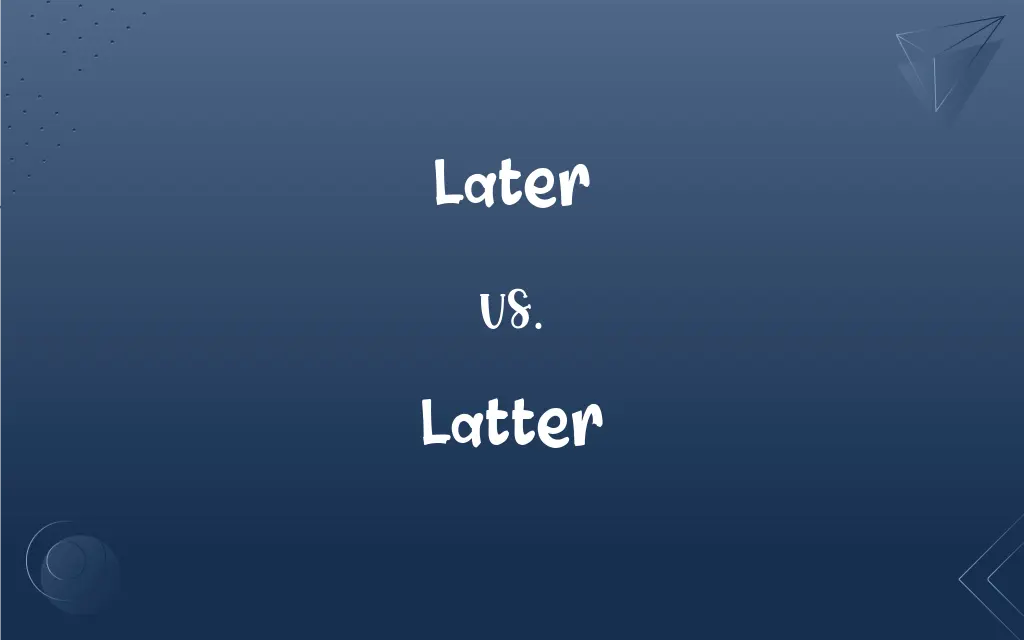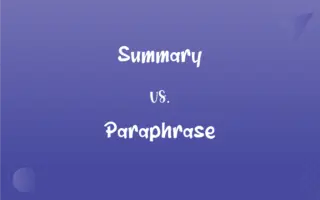Later vs. Latter: What's the Difference?
Edited by Aimie Carlson || By Janet White || Published on November 9, 2023
"Later" refers to a subsequent time; "Latter" denotes the second of two mentioned things.

Key Differences
"Later" is an adjective or adverb that points to a time that follows the current moment. "Latter" is an adjective indicating the second of two items or options previously mentioned.
When someone says they will see you "later," they mean they will see you at a future time. When someone refers to the "latter" option, they are speaking about the second of two choices they've mentioned.
"Later" is commonly used in everyday conversations to signify something happening after the present time. "Latter," although also used frequently, often appears in contexts where a speaker or writer has listed two items and wants to reference the second.
If you're deciding between two movies to watch and choose the second one, you're picking the "latter" option. If you decide to watch that movie at a time subsequent to now, you're watching it "later."
Essentially, while "later" is all about timing, "latter" is about distinguishing between two mentioned subjects.
ADVERTISEMENT
Comparison Chart
Definition
Pertaining to a subsequent time
Referring to the second of two things mentioned
Part of Speech
Adjective or Adverb
Adjective
Common Usage
Time-related contexts
Distinguishing between two listed items
Position in Sequence
Does not define position
Always the second
Synonym
Afterwards, subsequently
Last (when referencing two items)
ADVERTISEMENT
Later and Latter Definitions
Later
Later points to a subsequent event.
The sequel came out five years later.
Latter
Latter points to the end segment.
The project's success became apparent in the latter stages.
Later
Later denotes a future time.
I will do my homework later.
Latter
Latter can denote the more recent of two periods.
She was more active in the latter half of her life.
Later
Later signifies after the current moment.
She will arrive later than expected.
Latter
Latter distinguishes the second of two.
Between coffee and tea, I prefer the latter.
Later
Later refers to the following part.
Find out what happens later in the story.
Latter
Latter differentiates between two subjects.
Among apples and oranges, the latter is citrus.
Later
Later can mean in the near future.
We'll discuss this topic later.
Latter
Latter identifies the last mentioned.
In a comparison between cats and dogs, the latter are often seen as more loyal.
Later
Subsequently; afterward. Often used with on
She arrived on the ferry, and he came later. He later felt that he was wrong. Later on, we watched a movie.
Latter
Being the second of two persons or things mentioned
Regarding captain and major, the latter rank is higher.
Later
(Informal) Used to express goodbye.
Latter
Near or nearer to the end
The latter part of the book.
Later
Afterward in time (used with than when comparing with another time).
My roommate arrived first. I arrived later.
I arrived later than my roommate.
Latter
Further advanced in time or sequence; later
A style that has been revived in latter times.
Later
At some unspecified time in the future.
I wanted to do it now, but I’ll have to do it later.
Latter
The second of two persons or things mentioned.
Later
Coming afterward in time (used with than when comparing with another time).
The Victorian era is a later period of English history than the Elizabethan era.
Latter
Relating to or being the second of two items.
Later
Coming afterward in distance (following an antecedent distance as embedded within an adverbial phrase)
I felt some leg pain during the first mile of my run and I strained my calf two miles later .
Latter
Near (or nearer) to the end.
Later
At some time in the future.
The meeting was adjourned to a later date.
Latter
In the past, but close (or closer) to the present time.
Later
(slang) See you later; goodbye.
Later, dude.
Latter
Later; more recent; coming or happening after something else; - opposed to former; as, the former and latter rain.
Later
A brick or tile.
Latter
Of two things, the one mentioned second.
The difference between reason and revelation, and in what sense the latter is superior.
Later
Coming at a subsequent time or stage;
The future president entered college at the age of 16
Awaiting future actions on the bill
Later developments
Without ulterior argument
Latter
Recent; modern.
Hath not navigation discovered in these latter ages, whole nations at the bay of Soldania?
Later
At or toward an end or late period or stage of development;
The late phase of feudalism
A later symptom of the disease
Later medical science could have saved the child
Latter
Last; latest; final.
Later
Happening at a time subsequent to a reference time;
He apologized subsequently
He's going to the store but he'll be back here later
It didn't happen until afterward
Two hours after that
Latter
The second of two or the second mentioned of two;
Tom and Dick were both heroes but only the latter is remembered today
Later
At some eventual time in the future;
By and by he'll understand
I'll see you later
Latter
Referring to the second of two things or persons mentioned (or the last one or ones of several);
In the latter case
Later
Comparative of the adverb `late';
He stayed later than you did
FAQs
Is "later" related to future events?
Yes, "later" refers to a subsequent time or event.
How do I use "later" in a sentence about time?
E.g., "I'll see you later."
What does "latter" specify in a list?
"Latter" specifies the second of two items mentioned.
Can "later" be used to describe past events?
Typically no, "later" usually denotes a time after the current moment.
Is "latter" used for a list of more than two items?
No, "latter" specifically refers to the second of two items.
Can "latter" refer to the end part of something?
Yes, like "the latter part of the year."
Does "latter" only refer to previously mentioned items?
Yes, "latter" denotes the second of two things previously discussed.
Can "latter" be a synonym for "last"?
Only when differentiating between two items; "latter" is the second of two.
Is "later" an adjective or adverb?
"Later" can function as both, depending on its use in a sentence.
If someone says "See you later!", when are they implying?
They're implying a future meeting or interaction.
How do I differentiate "later" and "latter" in usage?
Use "later" for time-related contexts and "latter" for distinguishing between two mentioned items.
Can "later" indicate the near future?
Yes, like "We'll talk later today."
In a choice between "apple" and "banana," which is the "latter"?
"Banana" is the "latter" choice.
How do I use "latter" to refer to two authors?
E.g., "Between Smith and Johnson, the latter wrote more books."
Does "later" always mean a long time after?
No, "later" can be used for short future intervals, like "later today."
Can "later" be synonymous with "afterwards"?
Yes, both can denote a time after a specific event.
Is "latter" ever used in the context of time?
Yes, in cases like "the latter half of the year."
Can "later" be used in comparative forms?
Yes, like "He arrived later than she did."
Is "latter" commonly used in English?
While "latter" is used in English, its usage is more specific than "later."
Can "latter" refer to the end stages of a project?
Yes, like "in the latter stages of development."
About Author
Written by
Janet WhiteJanet White has been an esteemed writer and blogger for Difference Wiki. Holding a Master's degree in Science and Medical Journalism from the prestigious Boston University, she has consistently demonstrated her expertise and passion for her field. When she's not immersed in her work, Janet relishes her time exercising, delving into a good book, and cherishing moments with friends and family.
Edited by
Aimie CarlsonAimie Carlson, holding a master's degree in English literature, is a fervent English language enthusiast. She lends her writing talents to Difference Wiki, a prominent website that specializes in comparisons, offering readers insightful analyses that both captivate and inform.































































